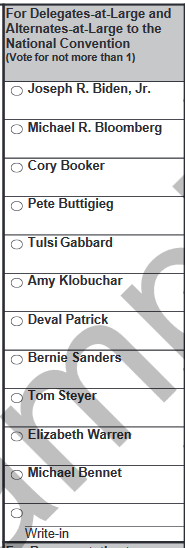So, Super Tuesday mowed down the number of Democratic candidates with the cold mechanical nature of a combine in an Iowa cornfield during harvest season. And yet, when you look at your Ohio Democratic primary ballot either by voting early by mail, or voting early in-person at the Board of Elections, or at your polling location on March 17th (this year, St. Patrick’s Day in Ohio will be blue!) by April 28th, here’s the list of names you’ll see:

Yep, there are still eleven names and a write-in spot on the March 17th primary ballot in Ohio. And of those, here’s the list of candidates who have not withdrawn or suspended their campaigns:
- Joseph R. Biden, Jr.
Tulsi GabbardBernie Sanders
[Update: Since this post initially ran on March 10th, both Tulsi Gabbard and then Bernie Sanders had since announced they were suspending their campaigns as well. However, they, too, will still remain on Ohio’s primary ballot]
So you’re saying those three are Biden is the only candidates I can vote for?
Well, except for Cory Booker, no. In the most literal sense of the word, you can vote for any of the candidates and the Board of Elections will count it and record it as a vote for that candidate even if they have dropped out of the race.
Whoa, why did you say “except for Cory Booker?”
Well, that’s because Cory Booker is the only candidate who timely notified the Ohio Secretary of State that he was withdrawing from Ohio’s primary. However, it was also filed at a time where Ohio law prohibited the Board of Elections from actually striking his name off the ballot. So when you vote, you should see postings informing you that Cory Booker withdrew and any votes for him will be void and not count. So to clarify: a vote for Cory Booker in the Ohio primary will literally not be counted.
But… I can vote for one of the other candidates, even if they dropped out the race?
Yes….

… but a vote for a candidate that has dropped out isn’t likely to help him or her still get the nomination or add to their delegate totals much.
When you vote in the Ohio presidential primary, what we’re really voting for is which candidate you want to win pledged delegates to support them for the nomination at the Democratic National Convention. Ohio will be sending 29 at-large pledged delegates and 89 pledged district delegates. At-large delegates are split in proportionate share among the candidates who get over 15% of the primary vote statewide. District delegates are split in proportionate share among the candidates who get over 15% of the primary vote in a congressional district. But here’s the catch: only candidates who have not suspended their campaigns or otherwise dropped out are eligible to win at-large delegates under the DNC rules. So a vote for a candidate who has suspended their campaign means your vote will have no impact on which candidate win’s Ohio at-large delegates and may only impact which candidates get some of the four district delegates awarded here.
In the 8th Congressional District, there are only four pledged delegates to be awarded among the candidates who get over 15% of the vote across the district. So the likelihood of voting for a candidate who has dropped out will have a significant impact on the nomination is very small as they can only get a share of four district delegates among the other candidates, and those candidates will get all of the at-large delegates that the withdrawn candidates cannot earn.
Why are you saying it only “may” impact who gets a district delegate?
Well, remember a candidate is only eligible to win a delegate if they are “viable” (i.e. they receive over 15% of the vote in the congressional district). If you vote for a candidate and they don’t receive over 15% of the vote in the district, then those votes won’t determine which candidates earn a delegate towards the nomination.
What about the write-in option on the ballot? Does that mean I can nominate anyone else?
No. Former presidential candidate Andrew Yang failed to make it on the Ohio primary ballot due to problems with his petitions, so he filed to run as a write-in candidate. In Ohio, a write-in vote only counts if it’s for one of the official write-in candidates (in this case, only Andrew Yang.) However, Yang suspended his campaign last month. Writing in any other name other than an official write-in candidate is considered an invalid vote for that race. Legally, it is no different than if you didn’t vote in the race at all.
What if I already mailed back my absentee ballot or voted in person for a candidate who has now dropped out?
I have bad news for you. There’s nothing you can in Ohio to change your vote once you cast any more than you can if you voted at your polling location on election day. That’s why many voters in Ohio waited until after Super Tuesday to cast their ballot so they could be tactical voters who voted based on the candidates remaining after Super Tuesday. Your ballot will still be counted.
So what are you really telling me?
It’s your vote. Exercise it however you want. Vote for whomever you want. We just wanted you to fully informed decision so you clearly understand how your vote could impact the nomination of the next President of the United States.

